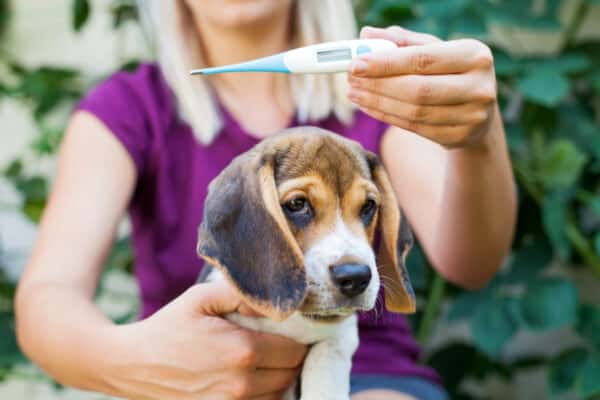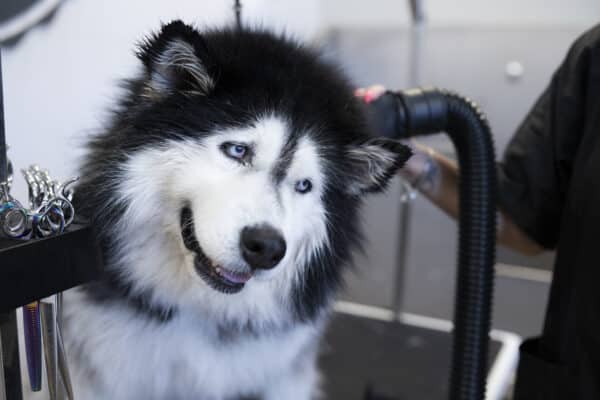Dog DNA testing kits are designed for dog owners to be able to painlessly collect samples from their dog at home, mail the sample back to the lab to be analyzed and get results sent back. However, DNA tests aren’t just about finding out what breeds your dog is mixed with anymore, but now help provide important information about your dog’s health. Let’s take a look at today’s dog DNA test kits.
How dog DNA tests work
Most dog DNA kits send dog owners a swab that’s put into the dog’s mouth and rubbed on the inside of the cheek for a short period of time. This process is quick and painless for dogs who are comfortable being handled. The swab is then sealed into a sterile container and can be mailed back to the DNA testing provider (usually in a self-addressed and postage paid envelope).
Back at the lab, the swab will be analyzed by scientists, and results will be mailed or emailed to you generally within a couple of weeks.
Reasons to test your dog’s DNA
The primary reason many people purchase an at-home doggie DNA test is to find out what breeds combined to make their unique pup, but there are other useful reasons to purchase a DNA kit, even if you have a purebred dog.
« Predict your dog’s future size. If you’ve adopted a new mixed-breed puppy, dog breed DNA tests can provide helpful information to plan for her development by providing estimates for what size and weight your puppy will be when she reaches adulthood. Knowing what breeds your dog is mixed with gives you an opportunity to learn about those breeds’ common behaviors, exercise needs, etc., which can help prevent conflict between dogs and their owners and allow owners to be more prepared with enrichment activities and training as the dog ages.
« Predisposed health issues. DNA health testing for dogs helps you to learn more about genetic health conditions your dog may have a higher likelihood of developing during her lifetime. If health risks come back, don’t panic. A DNA test doesn’t guarantee a dog will develop any of these conditions, but knowing your dog is predisposed to specific health risks can help you be prepared and proactive with preventive measures and early screening. Your veterinarian will then be able to monitor your dog more closely for these conditions over time and provide additional screenings as appropriate. The potential to learn more about your dog’s predisposition to certain medical conditions is a primary reason to DNA test your dog, even if she’s a purebred.
« Possible reactions and sensitivities. DNA tests can also determine if your dog has certain drug sensitivities and in some cases even test for allergies. The result from the health aspects of DNA testing is information that can be shared with your dog’s veterinarian, to be put into your dog’s medical file.
« Make connections. One fun and surprising aspect of dog DNA testing is finding dogs who are related to your dog or who are a similar DNA mix — especially if your dog is a rescue and you don’t know a lot about her background. Some dog DNA testing companies will alert you any time they process a DNA sample of a dog who is related or has a similar mix to your dog and provide you with an opportunity to contact the other dog’s owners via their website or a photo of that dog. Not only is it fun to see those photos, you can share information with other owners and learn more about health and behavioral trends that might run in your dog’s family.

« Contribute to science. If you choose to DNA test your dog, in addition to you learning more about your own dog, the scientists at the DNA testing company can use your dog’s information to further their study of canine genetics. This can help scientists learn more about health conditions and how they are passed down as well as why they are more prevalent in certain breeds. If you opt into allowing your dog’s data to be used by geneticists, it will be anonymized so you and your dog will remain private, and your dog’s DNA information won’t be traceable back specifically to her.
« Discover breed-specific concerns. Unfortunately, unfair discrimination still happens against certain dog breeds. Breed Specific Legislation (BSL) means that cities or other municipalities can restrict or ban certain breeds of dogs or dogs mixed with those breeds from living in the area.
At times, BSL is used against dogs of unknown breed but who have physical characteristics of targeted breeds. In this case a dog breed DNA test to prove a dog isn’t one of those breeds could be helpful; however, a DNA test documenting that a dog is one of the targeted breeds could be a problem.
Also, if you’re purchasing a new home insurance policy, many companies will ask what breed of dog you have, and some home insurance providers discriminate against certain breeds of dogs. If you have DNA tested your dog, you could be asked to disclose that breed information, which could impact your ability to purchase a policy from some companies.
« Looking to the future. Some kinds of DNA collection can even provide the material needed to clone your dog down the road if you ever wanted to. A cloned dog is a genetic twin to your dog, sharing key attributes, but will still have his own personality.
Dog DNA tests are more than meets the eye
On the lighter side of DNA testing, many dog lovers enjoy trying to guess what different breeds their dog is mixed with based on behavior, physical look and characteristics. Most dog lovers think they are pretty good at guessing breeds, but that isn’t always the case. A study conducted by the College of Veterinary Medicine at the University of Florida found that when veterinarians, breeders and dog trainers, all of whom would be considered dog experts, looked at photographs of dogs, the most prominent breed of dog was only correctly guessed 27% of the time. DNA tests are the only way to know what breeds a dog is mixed with.
Now that DNA testing has moved beyond the basic breed questions, at-home kits have become increasingly popular for dog owners. Maybe it’s time to give one a try.
Dog DNA Testing OptionsThere are multiple DNA testing options currently on the market, with some overlapping and some different features including breed determination, cost and screening for health conditions. Here’s how some of the top options compare: |
|||||||
| TESTS | Determines breed or mix | How many breeds | Screening for health risks | Family finder to connect with related dogs | Cost | At-home testing | Can be used for cloning |
| DNA My Dog dnamydog.com |
✔ | 100+ | Allergy testing available | ✔ | Starts at $68 | ✔ | |
| Easy DNA easy-dna.com |
✔ | 350+ | Allergy/conditions testing | Starts at $109 | ✔ | ||
| Embark embark.com |
✔ | 350+ | 200+ conditions | ✔ | Starts at $129 | ✔ | |
| OriVet orivet.com |
✔ | 350+ | 200+ conditions | Starts at $99.95 | ✔ | ||
| ViaGen viagenpets.com |
Starts at $1,600 | Samples must be collected by veterinarian | ✔ | ||||
| Wisdom Panel wisdompanel.com |
✔ | 350+ | 210 conditions | ✔ | Starts at $99.95 | ✔ | |





